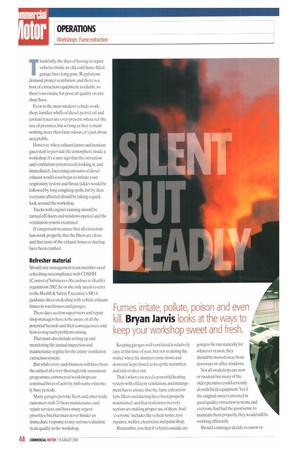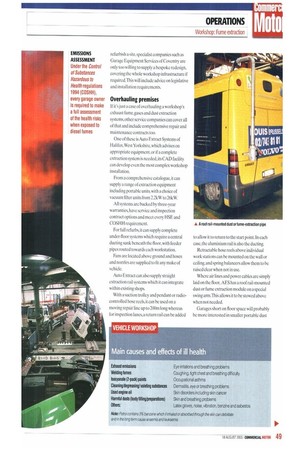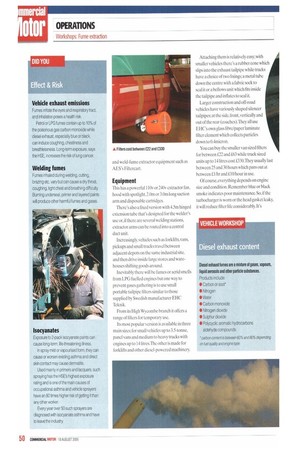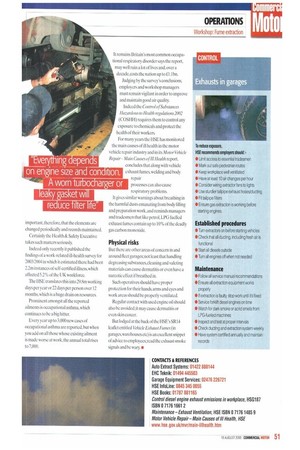T hankfully, the days of having to repair vehicles inside an
Page 48

Page 49

Page 50

Page 51

If you've noticed an error in this article please click here to report it so we can fix it.
old, cold fume-filled garage have long gone. Regulations demand proper ventilation, and there is a host of extraction equipment available, so there's no excuse for poor air quality on any shop floor.
Even in the most modern vehicle workshop, familiar whiffs of diesel, petrol, oil and coolant traces are ever-present, whatever the size of premises, but so long as they remain nothing more than faint odours, it's just about acceptable.
However, when exhaust fumes and noxious gases start to pervade the atmosphere inside a workshop, it's a sure sign that the extraction and ventilation system needs looking at, and immediately. Increasing amounts of diesel exhaust would soon begin to irritate your respiratory system and throat tickles would be followed by long coughing spells, but by then everyone affected should be taking a quick look around the workshop.
Trucks with engines running should be turned off, doors and windows opened and the ventilation system examined.
It's important to ensure that all extraction fans work properly, that the filters are clean and that none of the exhaust hoses or ducting have been crushed.
Refresher material Should any management team member need refreshing on compliance with COSHH (Control of Substances Hazardous to Health) regulations 2002, he or she only needs to refer to the Health & Safety Executive's SR14 guidance sheet on dealing with vehicle exhaust fumes in warehouses and garages.
These days, section supervisors and repair shop managers have to be aware of all the potential hazards and their consequences, and how to stop such problems arising.
That must also include setting up and monitoring the annual inspection and maintenance regime for the entire ventilation extraction system.
But while every such business will have been the subject of a very thorough risk assessment programme, commercial workshops are continual hives of activity, with some extremely busy periods.
Many garages provide fleets and other trade customers with 24-hour maintenance and repair services, and have many urgent priorities, but that must never hinder an immediate response to any serious reduction in air quality in the workshop. Keeping garages well ventilated is relatively easy at this time of year, but not so during the winter when the shutters come down and doors are kept closed, to keep the warmth in and rain or sleet out.
That's when you need a powerful heating system with efficient ventilation, and management has to ensure that the fume extraction fans, filters and ducting have been properly maintained, and that tradesmen in every section are making proper use of them. And 'everyone' includes the vehicle tester, tyre repairer, welder, electrician and paint shop.
Remember, too, that if vehicles outside are going to be run statically for whatever reason, they should be moved away from doorways or office windows, Not all workshops are new or modern but many of the older premises could certainly do with fresh equipment. Yet if the original owners invested in good quality extraction systems, and everyone had had the good sense to maintain them properly, they would still be working efficiently.
Should a manager decide to renew or refurbish a site, specialist companies such as Garage Equipment Services of Coventry are only too willing to supply a bespoke redesign, covering the whole workshop infrastructure if required.This will include advice on legislative and installation requirements.
Overhauling premises
If it's just a case of overhauling a workshop's exhaust fume,gases and dust extraction systems, other service companies can cover all of that and include comprehensive repair and maintenance contracts too.
One of these is Auto Extract Systems of Halifax,West Yorkshire, which advises on appropriate equipment, or if a complete extraction system is needed,its CAD facility can develop even the most complex workshop installation.
From a comprehensive catalogue, it can supply a range of extraction equipment including portable units, with a choice of vacuum filter units from 2.2kW to 26kW.
All systems are backed by three-year warranties, have service and inspection contract options and meet every HSE and COSHH requirement.
For full refurbs, it can supply complete under-floor systems which require a central ducting sunk beneath the floor,with feeder pipes routed towards each workstation.
Fans are located above ground and hoses and nozzles are supplied to fit any make of vehicle.
Auto Extract can also supply straight extraction rail systems which it can integrate within existing shops.
With a suction trolley and pendant or radiocontrolled hose reels,it can be used on a moving repair line up to 200m long whereas for inspection lanes, a return rail can be added to allow it to return to the start point. In each case, the aluminium rail is also the ducting.
Retractable hose reels above individual work stations can be mounted on the wall or ceiling, and spring balancers allow them to be raised clear when not in use.
Where air lines and power cables are simply laid on the floor, AES has a roof rail-mounted dust or fume extraction module on a special swing arm.This allows it to be stowed above when not needed.
Garages short on floor space will probably be more interested in smaller portable dust and weld-fume extractor equipment such as A ES's Filtercart,
Equipment
This has a powerful 110v or 240v extractor fan, hood with spotlight, 2.0m or 3.0m long suction arm and disposable cartridges.
There's also a fixed version with 4.5m hinged extension tube that's designed for the welder's use or, if there are several welding stations, extractor arms can be routed into a central duct unit.
Increasingly, vehicles such as forklifts, vans, pickups and small trucks travel between adjacent depots on the same industrial site, and then drive inside large stores and warehouses shifting goods around.
Inevitably there will be fumes or acrid smells from LPG fuelled engines but one way to prevent gases gathering is to use small portable tailpipe filters similar to those supplied by Swedish manufacturer EHC Teknik.
From its High Wycombe branch it offers a range of filters for temporary use.
Its most popular version is available in three main sizes; for small vehicles up to 3.5-tonne, panel vans and medium to heavy trucks with engines up to 14 litres.The other is made for forklifts and other diesel-powered machinery. Attaching them is relatively easy; with smaller vehicles there's a rubber cone which slips into the exhaust tailpipe while trucks have a choice of two fixings; a metal tube down the centre with a fabric sock to seal it or a bellows unit which fits inside the tailpipe and inflates to seal it.
Larger construction and off-road vehicles have variously shaped silencer tailpipes; at the side, front, vertically and out of the rear (coaches).They all use EHC's own glass fibre/paper laminate filter element which collects particles down to 0.4micron.
You can buy the smaller van sized filters for between £22 and £63 while truck sized units up to 14 litres cost 030:They usually last between 25 and 30 hours which pans out at between £1/hr and £10/hour in use.
Of course, everything depends on engine size and condition. Remember blue or black smoke indicates poor maintenance. So, if the turbocharger is worn or the head gasket leaky, it will reduce filter life considerably. It's important, therefore, that the elements are changed periodically and records maintained.
Certainly the Health & Safety Executive takes such matters seriously.
Indeed only recently it published the findings of a work-related ill-health survey for 2003/2004 in which it estimated there had been 2.2m instances of self-certified illness, which affected 5.2% of the UK workforce.
The HSE translates this into 29.8m working days per year or 22 days per person over 12 months, which is a huge drain on resources.
Prominent amongst all the reported ailments is occupational asthma, which continues to be a big hitter.
Every year up to 3,000 new cases of occupational asthma are reported, hut when you add on all those whose existing ailment is made worse at work,the annual total rises to 7,000. It remains Britain's most common occupational respiratory disorder says the report, may well ruin a lot of lives and, over a decade,costs the nation up to £1 .1bn. Judging by the survey's conclusions, employers and workshop managers must remain vigilant in order to improve and maintain good air quality.
Indeed the Control of Substances hazardous to Health regulations 2002 (COSH H) requires them to control any exposure to chemicals and protect the health of their workers.
For many years the HSE has monitored the main causes of ill health in the motor vehicle repair industry and in its Motor Vehicle Repair— Main Causes of Ill Health report, concludes that along with vehicle exhaust fumes, welding and body repair processes can also cause respiratory problems.
It gives similar warnings about breathing in the harmful dusts emanating from body filling and preparation work,and reminds managers and tradesmen that like petrol, LPG fuelled exhaust fumes contain up to 10% of the deadly gas carbon monoxide.
Physical risks
But there are other areas of concern in and around fleet garages; not least that handling degreasing substances, cleaning and vale Ling materials can cause dermatitis or even have a narcotic effect if breathed in.
Such operatives should have proper protection for their hands, arms and eyes and work areas should be properly ventilated. Regular contact with used engine oil should also be avoided; it may cause dermatitis or even skin cancer.
But lodged at the back of the HSE's SR14 leaflet entitled Vehicle Exhaust Fumes (in garages,warehouses etc) is an excellent snippet of advice to employees; read the exhaust smoke signals and be wary. •
















































































































































































































